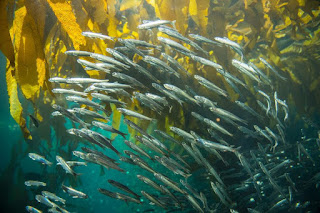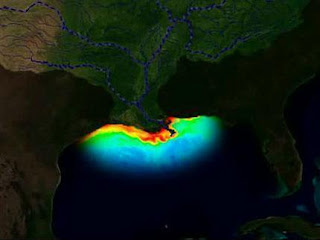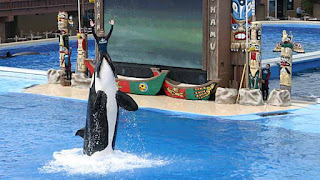1. Thousands of Illegally Caught Sharks Confiscated in the Galapagos

A Chinese vessel illegally fishing in the protected waters of the Galapagos Islands has been confiscated, along with thousands of sharks—300 tons of seafood overall. The boat was caught by chance, and goes to show how much illegal, unreported and unregulated fishing occurs even in marine sanctuaries. Many countries, like the Galapagos, lack the resources to police illegal fishing boats. The arrested crew could face up to three years in prison.
-----------------------------------------------
2. Fish Mistake Plastic Bits for Food A new study has found that anchovies mistake plastic debris for food because it smells like it. Over 50 species of fish in the ocean have been found to ingest plastic. Scientists have found that fish that eat plastic have “reduced activity rates and weakened schooling behavior, as well as compromised liver function.” That doesn’t bode well for humans, who bioaccumulate the plastic in the fish and seafood that they eat. By 2050 the ocean is predicted to have more plastic than fish.
A new study has found that anchovies mistake plastic debris for food because it smells like it. Over 50 species of fish in the ocean have been found to ingest plastic. Scientists have found that fish that eat plastic have “reduced activity rates and weakened schooling behavior, as well as compromised liver function.” That doesn’t bode well for humans, who bioaccumulate the plastic in the fish and seafood that they eat. By 2050 the ocean is predicted to have more plastic than fish.
-----------------------------------------------
 Oxygen-depleted “dead zones” are increasingly being found in our oceans. When oxygen in the oceans fell at similar rates some 94 million years ago, it caused a mass marine organism extinction. Dead zones occur when excessive nutrients from fertilizers and sewage accumulate in the ocean and cause algae blooms. When the algae die, they suck up oxygen. Marine organisms in dead zones either move on or die from the lack of oxygen.
Oxygen-depleted “dead zones” are increasingly being found in our oceans. When oxygen in the oceans fell at similar rates some 94 million years ago, it caused a mass marine organism extinction. Dead zones occur when excessive nutrients from fertilizers and sewage accumulate in the ocean and cause algae blooms. When the algae die, they suck up oxygen. Marine organisms in dead zones either move on or die from the lack of oxygen.
-----------------------------------------------
4. Indonesia to Turn Plastic Waste Into Road Tar
 Indonesia, the world’s second largest plastic polluter after China, consumes a million bags per minute. The government has unveiled a new plan to put a dent in the amount of plastic the country dumps at sea: using it to make roads. The shredded and melted plastic waste is added to road tar. Some environmentalists are skeptical and think that more effort should be made to reduce use of single-use plastics.
Indonesia, the world’s second largest plastic polluter after China, consumes a million bags per minute. The government has unveiled a new plan to put a dent in the amount of plastic the country dumps at sea: using it to make roads. The shredded and melted plastic waste is added to road tar. Some environmentalists are skeptical and think that more effort should be made to reduce use of single-use plastics.
5. Costa Rica to Become First Country to Ban All Single-Use Plastics
Read More...
-----------------------------------------------
6. SeaWorld Killer Whale Matriarch Euthanized
-----------------------------------------------
6. SeaWorld Killer Whale Matriarch Euthanized

SeaWorld killer whale Kasatka, the matriarch featured in the documentary Blackfish, was euthanized Tuesday due to having lung disease. She was 42 years old and came into captivity when she was 1 years old. She had 4 calves, 6 grand calves and 2 great grand calves. Ten killer whales in captivity in SeaWorld San Diego. Last year the company agreed to end its controversial orca captive-breeding program.
-----------------------------------------------
Be sure to "LIKE" http://facebook.com/SeaSave to ensure our "Week in Review" is delivered to your newsfeed every Friday.
Sea Save Foundation is committed to raising awareness of marine conservation. The Week in Review is a team effort produced by the Sea Save staff to provide a weekly summary of the latest in marine research, policy, and news.
